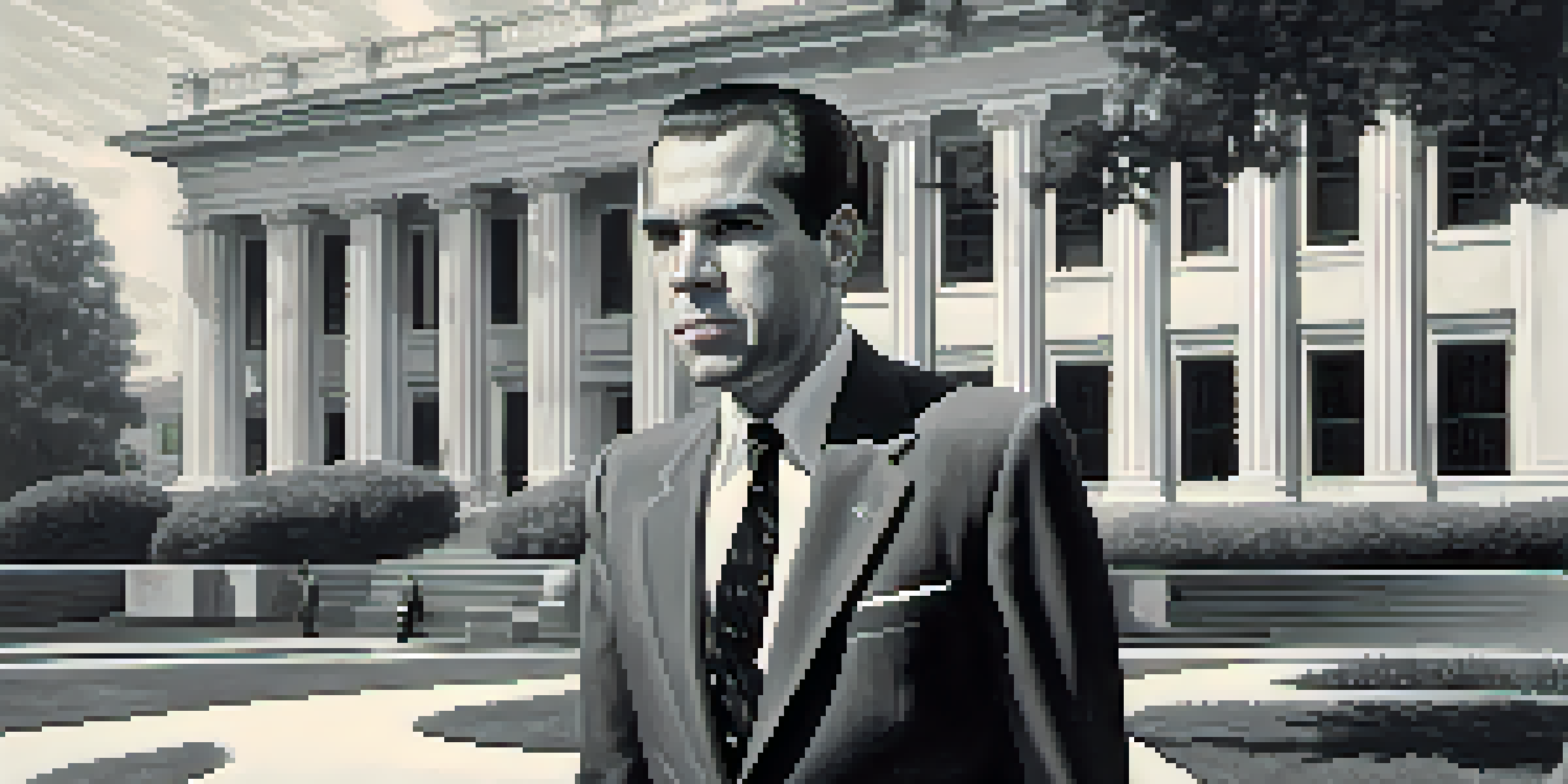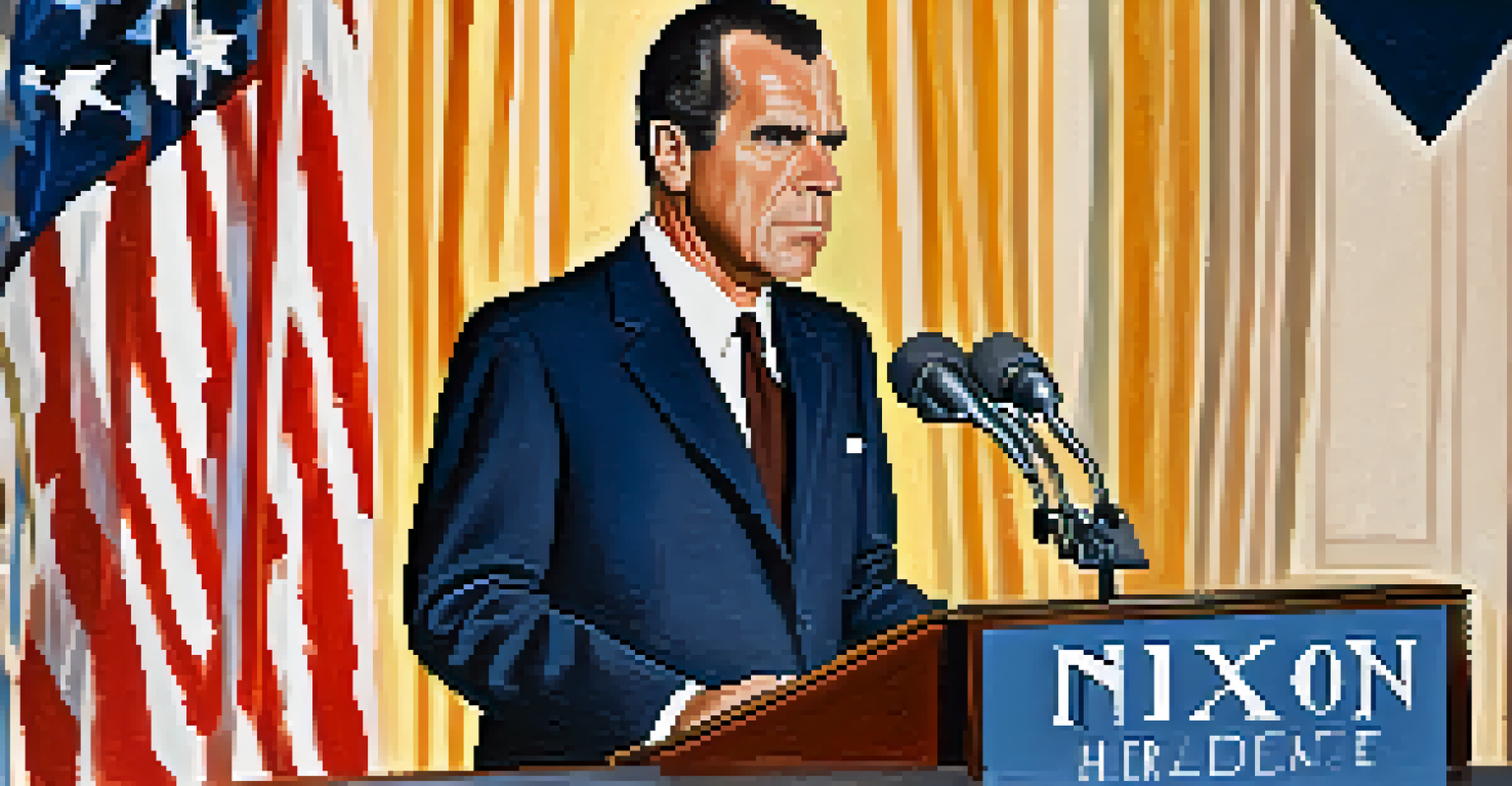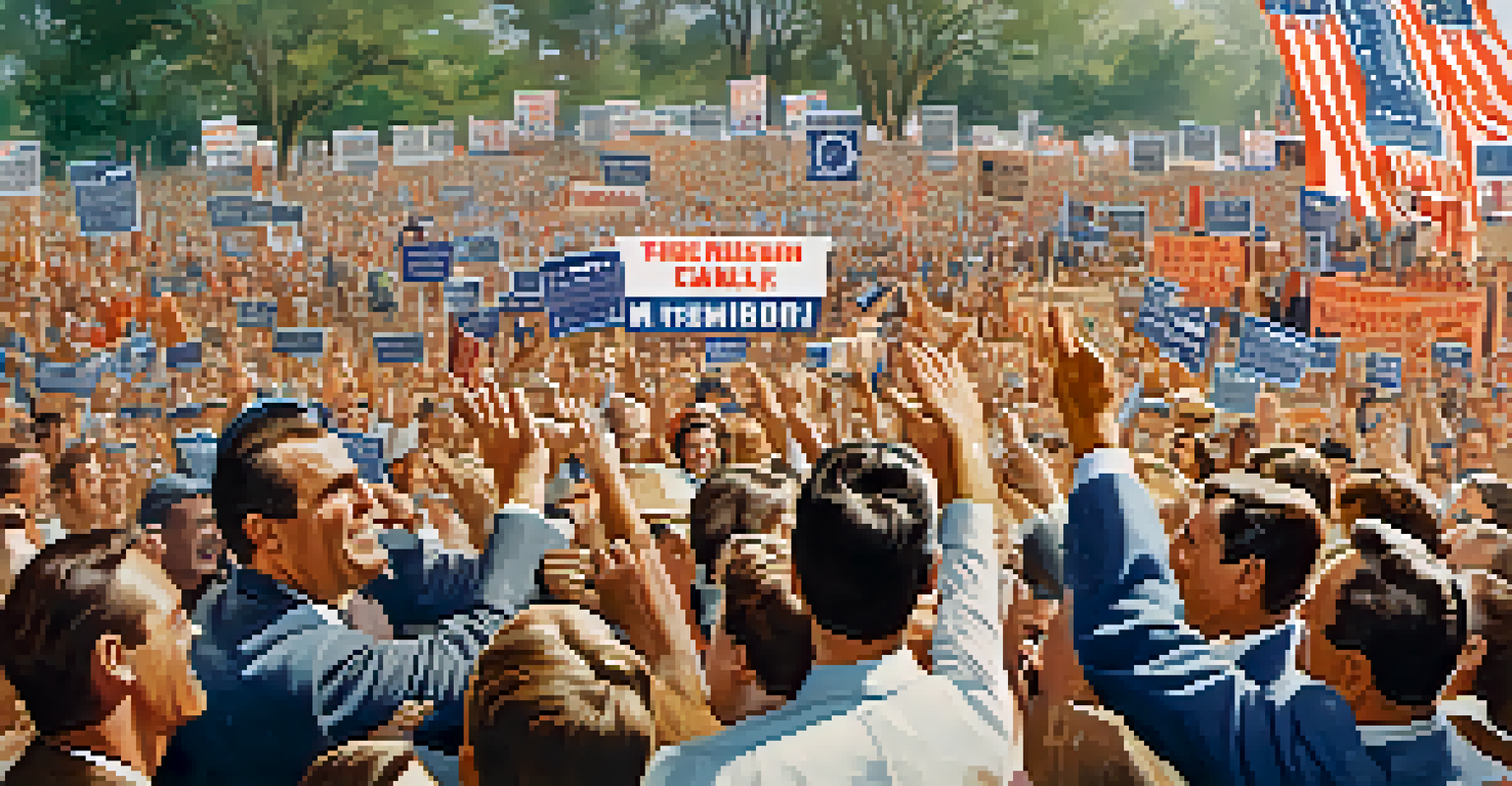Richard Nixon: From Los Angeles to the White House

Nixon's Early Life in Los Angeles: Shaping Future Leadership
Richard Nixon was born on January 9, 1913, in Yorba Linda, California, but spent much of his youth in nearby Los Angeles. Growing up in a modest Quaker family, he learned the values of hard work and determination early on. These formative years instilled in him a sense of ambition and a desire to make a difference in the world around him. His experiences in Los Angeles would later influence his political career and leadership style.
The greatest honor history can bestow is the title of peacemaker.
Nixon's education played a crucial role in his development. He attended Whittier College, where he excelled academically and participated in various extracurricular activities. His time at college not only sharpened his intellect but also honed his skills in debate and public speaking, which would serve him well in his future political endeavors. The friendships and connections he made during this time laid the groundwork for his eventual entry into politics.
After graduating, Nixon's pursuit of a law degree at Duke University further prepared him for his political career. He immersed himself in the study of law and governance, expanding his understanding of the American political system. This education, combined with his experiences in Los Angeles, helped shape his worldview and aspirations, ultimately leading him toward a life of public service.
World War II: A Crucial Turning Point for Nixon
Nixon's life took a significant turn when he enlisted in the United States Navy during World War II. Serving as a lieutenant, he was involved in various operations in the Pacific theater, which exposed him to leadership challenges and the realities of wartime decision-making. His military service not only bolstered his sense of duty but also provided him with valuable experiences that would inform his political career.

During the war, Nixon developed a reputation for being resourceful and capable under pressure. His ability to navigate complex situations and lead his men effectively earned him respect among his peers. This newfound confidence and leadership experience would become pivotal as he transitioned back to civilian life and sought a path in politics.
Nixon's Early Life Influenced Leadership
Nixon's upbringing in a modest Quaker family in Los Angeles instilled values of hard work and ambition that shaped his future political aspirations.
After the war, Nixon returned to California, where he quickly began to build a political career. His military service had instilled in him a sense of patriotism and commitment to public service, which he carried into his political endeavors. This period marked the beginning of Nixon's journey from a soldier to a statesman, setting the stage for his future electoral successes.
Political Beginnings: Nixon's Rise in California
Nixon's political career began in earnest when he ran for a seat in the U.S. House of Representatives in 1946. Capitalizing on his war service and strong connections within the Republican Party, he successfully won the election. This victory marked the first step in his long and tumultuous political journey, showcasing his ability to connect with voters and navigate the political landscape.
It is not the critic who counts; not the man who points out how the strong man stumbles, or where the doer of deeds could have done them better.
As a congressman, Nixon gained national attention for his staunch anti-communist stance, particularly during the Red Scare. His participation in the House Un-American Activities Committee (HUAC) allowed him to position himself as a fierce defender of American values. This focus on national security and anti-communism resonated with the American public, further solidifying his place in politics.
Nixon's early political career was characterized by his relentless ambition and willingness to tackle controversial issues. His experiences in the House laid the groundwork for his later roles, including his time as Vice President under Dwight D. Eisenhower. This period in California was crucial in shaping Nixon's political identity and set the stage for his future endeavors at the national level.
Vice Presidency: A Stepping Stone to the Presidency
In 1953, Nixon was sworn in as Vice President under President Dwight D. Eisenhower, marking a significant milestone in his political career. As Vice President, he sought to expand his influence and showcase his abilities on a national stage. This role provided him with invaluable experience in governance and a deeper understanding of the complexities of running the country.
During his tenure, Nixon traveled extensively, representing the U.S. abroad and engaging in diplomatic efforts. His famous trip to the Soviet Union in 1959 highlighted his commitment to international relations and showcased his ability to navigate tense political environments. These experiences not only bolstered his resume but also prepared him for the challenges he would face as a presidential candidate.
Military Service Enhanced Political Skills
Nixon's experiences as a Navy lieutenant during World War II provided him with crucial leadership skills and a sense of duty that guided his political career.
Nixon's time as Vice President was marked by both achievements and controversies, shaping his public perception. While he gained respect for his diplomatic efforts, he also faced criticism for his confrontational style. These mixed experiences would play a crucial role in shaping his campaign strategy as he prepared to run for the presidency in 1960.
The 1960 Presidential Election: A Defining Moment
The 1960 presidential election was a pivotal moment for Nixon, as he faced off against the charismatic John F. Kennedy. This election was notable for being the first to feature televised debates, which significantly influenced public perception. Nixon's performance in these debates was deemed lackluster compared to Kennedy's polished presence, impacting the election's outcome.
Despite his extensive political experience, Nixon struggled to connect with the television audience, leading to questions about his relatability. This election highlighted the growing importance of media in politics, as Kennedy's youthful energy resonated with voters. The defeat was a bitter pill for Nixon, but it did not deter him from his political aspirations.
Nixon's loss in 1960 served as a learning experience, prompting him to reevaluate his approach to campaigning and public engagement. He returned to California, vowing to regroup and come back stronger in future elections. This setback ultimately fueled his determination to make a successful comeback in politics, setting the stage for his next presidential run.
The Comeback: Nixon's 1968 Presidential Campaign
After a brief hiatus from politics, Nixon launched his comeback campaign in 1968, capitalizing on the political unrest and social upheaval of the time. He positioned himself as the candidate of stability and law and order, appealing to a disillusioned electorate. This strategy resonated with many Americans who were seeking a return to normalcy amid the chaos of the 1960s.
Nixon's campaign was marked by a focus on issues such as the Vietnam War and civil rights, allowing him to connect with diverse voter demographics. He employed a strategy of 'silent majority' rhetoric, targeting those who felt overlooked by the political discourse. This approach helped him build a broad coalition of support, ultimately leading to his victory in the 1968 election.
Presidency Marked by Achievements and Scandals
Nixon's presidency saw significant accomplishments like the establishment of the Environmental Protection Agency, but it was ultimately overshadowed by the Watergate scandal.
His successful campaign showcased Nixon's resilience and ability to adapt to changing political landscapes. He learned from past mistakes and effectively utilized media and messaging to his advantage. This comeback not only solidified his political legacy but also demonstrated his determination to lead the nation during turbulent times.
Presidency: Achievements and Controversies
Richard Nixon was inaugurated as the 37th President of the United States on January 20, 1969. His presidency was marked by significant achievements, including the establishment of the Environmental Protection Agency and groundbreaking advancements in foreign policy, such as the historic opening of relations with China. These accomplishments showcased his ability to navigate complex political issues and make impactful decisions.
However, Nixon's presidency was also fraught with controversies, particularly regarding the Vietnam War and domestic unrest. His administration faced criticism for its handling of the war and the anti-war protests that erupted across the country. The public's growing discontent highlighted the challenges he faced in maintaining support for his policies, leading to a tumultuous political climate.

The culmination of Nixon's presidency came with the Watergate scandal, which ultimately led to his resignation in 1974. This scandal overshadowed many of his accomplishments and has since become a defining moment in American political history. Despite the controversies, Nixon's legacy remains complex, as he navigated significant challenges and made notable contributions during his time in office.